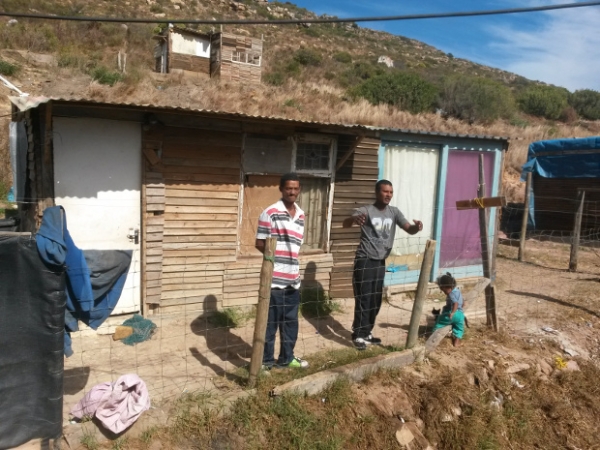Hangberg residents vow to fight evictions

Some Hangberg residents living in the area known as “Die Sloot” say they will not move out of their homes despite looming threats of eviction.
Hangberg is the area in Hout Bay, Cape Town, under the imposing mountain slope named the Sentinel. It is home to a struggling fishing community.
“Where must we go? I grew up here, and now I have a family of my own here. We have nowhere else to go. I’ve been to other areas, but there is so much crime and gangsterism. It’s safer here,” said resident Silver Marnivell.
Nearly eight months ago, resident Santonio Jonkers was arrested for contravening a High Court order interdicting further settlement on the Sentinel.
Jonkers was dragged by his dreadlocks for 150 metres through fynbos and wattle trees, by an elite squad of police officers in the early hours of 30 September.
Jonkers is appealing his eviction in the Wynberg Magistrates Court. He is due back in court on 28 July.
Die Sloot is a small informal settlement —part of Hangberg— situated on the Sentinel’s fire break.

Despite it’s idyllic appearance, Hangberg is a community beset by conflict and crime. Photo by Barbara Maragele.
The area has been at the centre of violent uprisings over the past five years and tensions around housing in Hangberg. Following violent protests in 2010, a Peace and Mediation Forum (PMF) was elected to represent the community. However, there has been ongoing disputes between the PMF and some of the Hangberg residents.
In 2011, the PMF struck a “peace accord” with the City of Cape Town and other governmental stakeholders. An agreement within this accord, which later became an order of the Western Cape High Court, was that the unlawful occupiers of the Sentinel would eventually move off the land voluntarily. This never happened.
In two weeks, the City along with the PMF, police, provincial government and other members of the community are expected to have a workshop to try and tackle issues around housing and crime in Hangberg.
When GroundUp recently visited the area, Marnivell, who lives with his wife and their two children aged one and five, recalled the night of Jonkers’ arrest. He said that while everyone was still traumatized by the incident, they were not prepared to move from their homes.
“We don’t know when they [police] will be back because it could be us next. I also don’t know why they just took [Jonkers] if we started living here after him. We are living here peacefully and not bothering anyone. Why must we be treated like animals?” he said.
Jonkers, who now sleeps in a small storeroom with his girlfriend and their young child, said the fight over alternative housing in the area has caused serious divisions in the once close community. Apparently referring to the PMF, he says “We have a situation where a small group of people are making decisions for the whole community without telling us.”
PMF chairperson, Jan Lewis, said the PMF was inclusive and the tensions in the community were fueled by political minorities. But he also criticises the authorities. “It became a problem for us when metro police and other authorities come do the evictions at night. We met with the station commissioner and other community leaders on Wednesday. In two weeks time, we will be having a workshop to figure out the right way to deal with the issues in the area.”
“Besides the housing situation on the mountain, crime in the area has also become very bad. I look forward to the workshop because we need all the roleplayers to come together in order to move forward,” Lewis said.
The City’s Mayco member for Human Settlements, Benedicta van Minnen, said disputes around the shortage of land for new housing development in the area has caused a breakdown of trust in the community. “The disrespect of the law shown by some residents in Hangberg is proof of this. Some residents are unwilling to work with the City to find a solution, as illustrated by the number of people in violation of the Order of the High Court.”
“City officials revisit the site on a regular basis, but are met with hostility. Officials are subject to verbal abuse and sometimes physical threats to such an extent that it is dangerous for them to visit the site.”
New residential units are being built to meet the housing shortage. Van Minnen said, “The first 71 units will be completed by July 2015. It will provide a safe and clean living space for the families of Hangberg. The roll-out of the Brick Skins project to our eight existing blocks of rental flats also ensures improved quality of life for residents.”
Next: Scavenging for vegetarian morsels
Previous: On D-Day for public sector wage agreement, consider lopsided government salaries

This article is licensed under a Creative Commons Attribution-NoDerivatives 4.0 International License.


